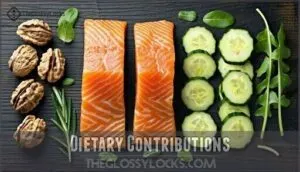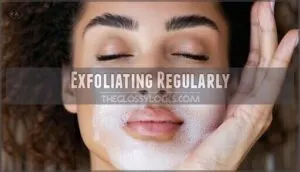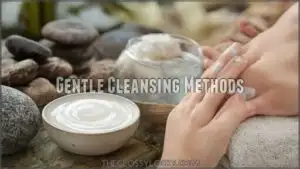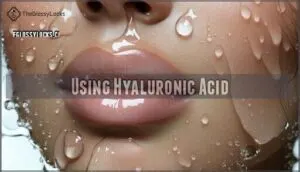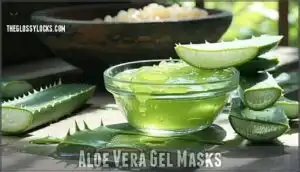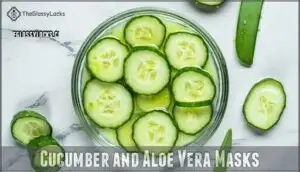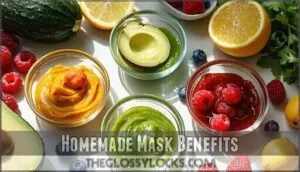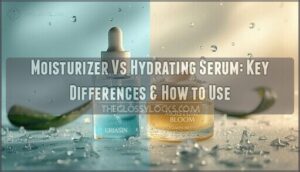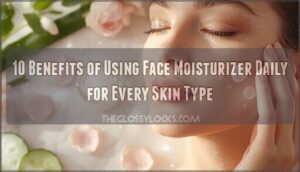This site is supported by our readers. We may earn a commission, at no cost to you, if you purchase through links.
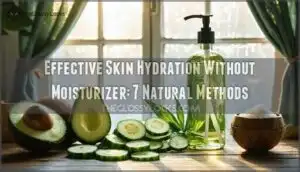 You can achieve effective skin hydration without moisturizer through several proven methods.
You can achieve effective skin hydration without moisturizer through several proven methods.
Start by drinking plenty of water throughout the day, as hydration begins from within.
Add a humidifier to your bedroom to combat dry air that steals moisture from your skin.
Take shorter, lukewarm showers instead of hot ones, which strip away natural oils.
Apply pure aloe vera gel or coconut oil as natural alternatives.
Load your plate with water-rich foods like cucumbers, watermelon, and leafy greens.
Avoid harsh soaps and protect yourself from sun exposure, which accelerates moisture loss.
These simple changes can transform your skin’s health naturally, but there’s more to this hydration puzzle, including the importance of drinking plenty of water and maintaining a routine that promotes natural oils and overall skin health.
Table Of Contents
- Key Takeaways
- Natural Hydration Methods
- Avoiding Dehydrating Factors
- Dietary Contributions
- Skincare Practices
- DIY Hydration Remedies
- Frequently Asked Questions (FAQs)
- How to hydrate your face without a moisturizer?
- Can you treat dry skin without lotion?
- Should you use a moisturizer or a hydrating cleanser?
- Does a moisturizer really hydrate your skin?
- Are lightweight moisturizers hydrating?
- How to use face moisturizer for dry skin?
- Can you hydrate skin without moisturizer?
- What should every woman use instead of moisturizer?
- How do you hydrate your skin naturally?
- How often should I apply natural oils?
- Conclusion
Key Takeaways
- Hydrate from within by drinking plenty of water daily and eating water-rich foods – Your skin’s hydration starts internally, so you’ll want to drink eight glasses of water and load up on cucumbers, watermelon, and leafy greens to keep your cells plump and naturally moisturized.
- Use natural alternatives like aloe vera gel and coconut oil instead of traditional moisturizers – You can apply pure aloe vera gel or coconut oil directly to your skin for deep hydration that penetrates your skin barrier more effectively than commercial products.
- Avoid dehydrating habits that strip your skin’s natural oils – You’ll need to take shorter, lukewarm showers instead of hot ones, switch to gentle sulfate-free cleansers, and protect yourself from sun exposure to prevent moisture loss.
- Create a moisture-friendly environment with humidifiers and DIY treatments – You can boost your indoor humidity to 40-60% and make homemade masks with ingredients like honey and avocado to naturally support your skin’s hydration without relying on store-bought moisturizers.
Natural Hydration Methods
Your skin doesn’t need expensive moisturizers to stay hydrated when you understand how natural methods work at the cellular level.
These scientifically-backed approaches, from drinking adequate water to applying natural oils, can restore your skin’s moisture barrier while supporting its natural hydration processes from both inside and outside your body, utilizing natural methods.
Drinking Plenty of Water
Your body’s internal hydration system works like a well-oiled machine when you maintain proper water intake.
Your skin’s natural moisture factory runs smoothly when you fuel it with consistent hydration from within.
Drinking eight glasses daily supports skin hydration by keeping cells plump and elastic.
Monitor your thirst mechanisms and aim for clear urine as hydration indicators.
Quality water with balanced electrolytes optimizes internal skin hydration, creating a natural foundation that radiates outward through healthy, moisturized skin, which is essential for proper water intake and overall skin hydration.
Eating Water-Rich Foods
Your hydration diet plays a bigger role in skin health than you might think.
Water-rich fruits like watermelon and oranges deliver impressive water content directly to your cells.
Cucumbers pack 95% water, while strawberries and tomatoes boost your dietary hydration naturally.
These food sources create a balanced diet that supports skin hydration without moisturizer, complementing your daily water intake perfectly, and overall contribute to a healthy skin through dietary hydration.
Using Humidifiers
When indoor heating leaves your skin feeling parched, a humidifier becomes your secret weapon against dryness.
These devices boost air moisture levels, helping your skin retain its natural hydration while keeping nasal passages comfortable. Many users find that a humidifier improves skin.
Key humidifier benefits include:
- Ideal humidity levels (40-60%) prevent moisture loss
- Various humidifier types suit different room sizes
- Proper humidifier placement maximizes effectiveness
- Regular humidifier maintenance prevents mold growth
Applying Aloe Vera Gel
Beyond indoor moisture control, aloe vera gel offers direct skin hydration without traditional moisturizers.
This natural alternative contains glucomannans that create a protective film, preventing water loss while drawing moisture deep into your skin.
Apply fresh gel from the plant or quality products for sunburn relief, eczema soothing, and enhanced skin healing through its humectant properties.
For oily skin, consider lightweight hydration options to avoid clogged pores.
Coconut Oil Benefits
Coconut oil naturally penetrates your skin barrier deeper than most moisturizer alternatives, delivering anti-inflammatory benefits that soothe irritated skin.
Nature’s deep-penetrating miracle worker soothes and hydrates where traditional moisturizers can’t reach.
This versatile natural oil contains medium-chain fatty acids that boost skin hydration while offering bacterial properties for effective acne treatment.
- Deep oil penetration repairs damaged skin barriers more effectively than surface-level treatments
- Anti-inflammatory compounds reduce redness and calm sensitive skin conditions naturally
- Antimicrobial properties fight acne-causing bacteria without harsh chemical ingredients
- Natural skin hydration locks moisture in for hours without greasy residue
- Versatile application works as both daily moisturizer and targeted acne treatment
Avoiding Dehydrating Factors
Just as you’re careful about what you put on your skin, you need to be equally mindful of what strips moisture away from it.
Identifying and avoiding common dehydrating factors can substantially improve your skin’s natural hydration levels, making the difference between dry, flaky skin and a healthy, supple complexion.
Hot Showers Damage
While hot showers feel amazing after a long day, they’re actually sabotaging your skin hydration efforts.
The scalding water strips away your skin’s natural oils, compromising your skin barrier and leading to immediate dryness.
Instead, opt for lukewarm showers and limit your shower duration to preserve those essential oils that keep dry skin at bay, and help maintain your skin’s natural hydration efforts.
Harsh Soap Effects
Many people unknowingly sabotage their skin’s natural moisture balance with harsh cleansers.
These products strip away your skin’s protective oils, leading to skin barrier damage and chronic skin dehydration.
Choose gentler alternatives to protect your skin:
- Switch to sulfate-free cleansers that won’t disrupt your skin’s pH balance
- Look for cream-based or oil-based cleansers instead of foaming formulas
- Avoid products with strong fragrances that cause irritation and redness
- Test new products on a small skin patch first
- Consider cleansing oils for sensitive skin issues
Gentle cleansers preserve your natural oils while effectively removing dirt and impurities, preventing the cycle of skin dryness that harsh soaps create, and this helps maintain the skin’s natural pH balance and protective oils, ensuring a healthy skin barrier and preventing chronic skin dehydration.
Sun Exposure Risks
Sun exposure dehydrates your skin faster than you’d think.
UV radiation breaks down collagen and strips away natural moisture, leading to premature aging and potential skin cancer risks.
You’ll need sunscreen with SPF 30 minimum for effective UV protection.
Sunburn prevention isn’t just about avoiding pain – it’s about preserving your skin’s ability to retain water naturally, which helps prevent skin cancer risks and supports overall skin health by maintaining natural moisture.
Dry Air Consequences
Indoor humidity levels plummet during winter, creating a moisture-sucking environment that leaves your skin feeling tight and flaky.
Dry air strips away your skin’s natural oils, compromising your skin barrier and triggering skin dehydration.
Environmental factors like heating systems worsen the problem.
A humidifier restores balance, offering respiratory effects benefits while preventing dry skin naturally.
Dietary Contributions
You can nourish your skin from the inside out by choosing foods that naturally boost hydration and support your skin’s moisture barrier.
The nutrients you consume, particularly omega-3 fatty acids from salmon and walnuts, work alongside water-rich foods like cucumbers and leafy greens to keep your skin plump and healthy without relying on topical moisturizers.
Omega-3 Fatty Acids Role
Beyond avoiding dehydrating habits, you can boost skin hydration from within through omega3 fatty acids.
These healthy fats strengthen your skin barrier and enhance moisture retention by integrating into cell membranes.
Your diet becomes a powerful tool when you include salmon, walnuts, and flaxseeds, which provide inflammation reduction while supporting overall skin health through improved barrier function.
Studies suggest that omega-3s may also contribute to sun protection benefits.
Hydrating Foods Importance
Water-rich foods like cucumbers, watermelon, and oranges work as nature’s hydration boosters, delivering moisture directly to your skin cells.
You’ll find that incorporating these hydrating foods into your healthy diet creates a foundation for skin radiance from within.
Waterrich fruits complement your body’s natural processes, supporting internal hydration while providing essential vitamins for lasting skin hydration benefits, which can be considered as nature’s hydration boosters, and help achieve skin radiance.
Essential Fatty Acids Benefits
Fatty acids work like tiny repair crews for your skin barrier, patching up damage and locking in moisture.
When you eat omega3-rich foods like salmon or walnuts, you’re feeding your cells the healthy fats they crave.
This diet integration reduces inflammation while boosting moisture retention, giving you naturally supple skin that doesn’t rely on bottled solutions.
Natural ingredients offer antioxidant skin protection, safeguarding against free radical damage and providing antioxidant benefits for skin protection.
Leafy Greens and Tomatoes
Packed with vitamins A, C, and K, leafy greens boost your skin’s natural defenses while promoting healthy cell turnover.
Tomatoes deliver lycopene benefits and antioxidant properties that protect against environmental damage.
These hydrating foods enhance nutrient absorption, supporting skin elasticity from within, and their dietary impact on skin hydration proves that healthy skin starts with smart food choices and natural methods.
Skincare Practices
Your daily skincare routine can substantially impact your skin’s hydration levels, and the right practices will help you maintain moisture without relying on traditional moisturizers.
By focusing on gentle cleansing methods, regular exfoliation, and choosing products with hydrating ingredients like hyaluronic acid, you’ll create an effective foundation for naturally hydrated skin.
Exfoliating Regularly
Through regular exfoliation, you’ll discover your skin’s natural ability to absorb moisture effectively.
Dead skin cells create barriers that block hydration, so removing them twice weekly enhances skin renewal.
Chemical exfoliants work gentler than physical scrubs for most skin types. Many people use alpha hydroxy acids for exfoliation.
However, over-exfoliation risks damaging your moisture barrier, so listen to your skin’s needs and adjust exfoliation frequency accordingly.
Gentle Cleansing Methods
After exfoliating, you’ll want to cleanse without stripping your skin’s natural oils.
Choose sulfate-free cleansers or gentle cleansing balms that maintain your skin’s pH balance. Micellar water offers effective cleansing without harsh rubbing, while oil cleansing dissolves impurities naturally.
Use lukewarm water and natural sponges for mild exfoliation. These hydrating cleansers preserve your skin’s moisture barrier.
Avoiding Harsh Ingredients
Your skin’s worst enemies hide in plain sight on ingredient labels.
Alcohol strips away natural oils faster than you can say "dry patches," while synthetic fragrances trigger sensitivities that’ll leave you red-faced.
Ditch sulfate-heavy cleansers that foam like bubble baths but devastate your skin barrier.
Parabens disrupt hormones, impacting estrogenic receptors and potentially leading to endocrine disruption.
Choose alcohol alternatives, fragrance-free formulas, and sulfate-free cleansers instead.
Your skin will thank you by staying naturally hydrated.
Using Hyaluronic Acid
Hyaluronic acid acts as nature’s moisture magnet, drawing water to your skin’s surface like a powerful humectant.
This game-changing ingredient holds up to 1,000 times its weight in water, making it perfect for dehydrated skin.
HA’s effectiveness depends on existing skin moisture levels.
Apply HA serum to damp skin, then seal with an occlusive to prevent moisture loss and strengthen your skin barrier.
DIY Hydration Remedies
You can create powerful hydrating treatments right in your kitchen using simple ingredients like aloe vera, avocado, and honey that naturally boost your skin’s moisture levels.
These homemade remedies offer a cost-effective way to nourish your skin without relying on commercial moisturizers, allowing you to customize treatments based on your specific skin needs, which can be very powerful.
Aloe Vera Gel Masks
Fresh aloe vera gel creates powerhouse face masks that deliver instant hydration without heavy moisturizers.
You’ll extract gel directly from leaves or use pure store-bought versions for maximum aloe vera benefits.
Apply this cooling remedy for 15-20 minutes, allowing natural vitamins and minerals to penetrate deeply.
For sensitive skin use, aloe vera gel provides gentle, non-irritating hydration that soothes inflammation naturally.
Avocado and Honey Masks
Everyone loves a good kitchen remedy that doubles as skincare magic.
Mash one ripe avocado with two tablespoons of raw honey for your DIY avocado moisturizer. This powerhouse combination delivers deep hydration through healthy fats and natural humectants.
Apply for fifteen minutes twice weekly for maximum skin benefits.
Different honey varieties offer unique properties—manuka honey provides extra healing power for your homemade face masks.
For sensitive skin, oatmeal soothes irritation.
Cucumber and Aloe Vera Masks
Two powerhouse ingredients combine to create the ultimate cooling rescue for thirsty skin.
Cucumber’s 95% water content pairs perfectly with aloe vera’s healing compounds, delivering instant relief and deep hydration through these simple DIY recipes.
Transform your skin with these cooling effects:
- Blend fresh cucumber with pure aloe vera gel – creates an instantly rejuvenating mask
- Apply thick layer and relax for 15-20 minutes – allows maximum absorption of natural hydration
- Use 2-3 times weekly – maintains ideal skin benefits without over-treatment
Homemade Mask Benefits
Creating your own face masks puts you in the driver’s seat of your skincare routine.
DIY masks offer complete control over mask ingredient selection and mask customization, letting you tailor treatments to your skin’s unique needs.
You’ll save money while avoiding harsh chemicals found in commercial products, making natural methods accessible and effective for achieving ideal skin hydration.
| Benefit Category | Specific Advantage |
|---|---|
| Cost Effectiveness | Homemade face masks cost 70% less than store-bought alternatives |
| Mask Ingredient Synergy | Natural ingredients work together without synthetic additives |
| Mask Application Timing | Apply when convenient, controlling thickness and duration |
| Mask Frequency | Customize usage based on your skin’s changing needs |
Frequently Asked Questions (FAQs)
How to hydrate your face without a moisturizer?
Drink plenty of water daily, apply natural oils like jojoba or coconut oil.
Use aloe vera gel, create DIY honey masks.
Maintain indoor humidity with a humidifier to keep your skin naturally hydrated.
Can you treat dry skin without lotion?
Yes, you can treat dry skin without lotion.
Natural oils like jojoba and coconut oil, aloe vera gel, honey masks, are effective natural remedies.
Staying hydrated, using humidifiers, and eating omega-3 rich foods also effectively restore moisture naturally.
Should you use a moisturizer or a hydrating cleanser?
Both products complement each other beautifully rather than competing.
You’ll want to use a gentle, hydrating cleanser first to prep your skin, then follow with a moisturizer to lock in that precious hydration and create a protective barrier.
Does a moisturizer really hydrate your skin?
Moisturizers don’t actually hydrate your skin—they trap existing moisture and prevent water loss.
True hydration comes from drinking water, eating hydrating foods, and using products with ingredients like hyaluronic acid that attract moisture.
Are lightweight moisturizers hydrating?
Studies show lightweight moisturizers contain 80% water content, making them surprisingly hydrating.
You’ll find they absorb quickly without heaviness, delivering essential moisture through humectants like hyaluronic acid that bind water to your skin effectively.
How to use face moisturizer for dry skin?
Apply face moisturizer to damp skin immediately after cleansing while it’s still slightly wet.
Use gentle upward motions, focusing on dry areas.
Choose products with hyaluronic acid or ceramides for maximum hydration.
Can you hydrate skin without moisturizer?
Don’t put all your eggs in one basket—you can absolutely hydrate skin without traditional moisturizer.
Try natural oils like jojoba or coconut oil, aloe vera gel, hydrating face masks, and drinking plenty of water daily to achieve this goal, focusing on natural oils.
What should every woman use instead of moisturizer?
You’ll find natural oils like jojoba, coconut, or olive oil work beautifully as moisturizer alternatives.
They penetrate deeply, mimic your skin’s natural barrier, and provide lasting hydration without heavy creams or synthetic ingredients, offering a natural solution.
How do you hydrate your skin naturally?
While expensive creams promise miracles, your kitchen holds better secrets.
Drink eight glasses of water daily, apply fresh aloe vera gel, use natural oils like jojoba, and run a humidifier to naturally hydrate your skin.
How often should I apply natural oils?
For ideal results, you’ll want to apply natural oils once or twice daily. Start with once daily after cleansing, then increase frequency based on your skin’s response and hydration needs.
Conclusion
Your skin’s moisture barrier works like a well-maintained garden—it thrives with proper care and natural nourishment rather than artificial supplements.
These methods for effective skin hydration without moisturizer offer sustainable solutions that work with your body’s natural processes.
By staying hydrated, eating water-rich foods, using gentle products, and protecting yourself from environmental stressors, you’ll maintain healthy, glowing skin.
Remember, consistency matters more than perfection. Start with one or two techniques and gradually build your routine.
- https://www.medicalnewstoday.com/articles/fish-oil-for-skin
- https://www.healthline.com/nutrition/omega-3-benefits-on-skin-and-hair
- https://www.sciencedirect.com/science/article/pii/S0952327824000358
- https://slmdskincare.com/blogs/learn/8-ways-you-should-be-using-the-slmd-hyaluronic-acid-serum?srsltid=AfmBOora26DOutdDM0m4HBbzfUFQIOe0CY3HymqE0Mjru-bpySNSaQzm
- https://us.gotoskincare.com/blogs/the-go-to-guide/hyaluronic-acid-mistakes


